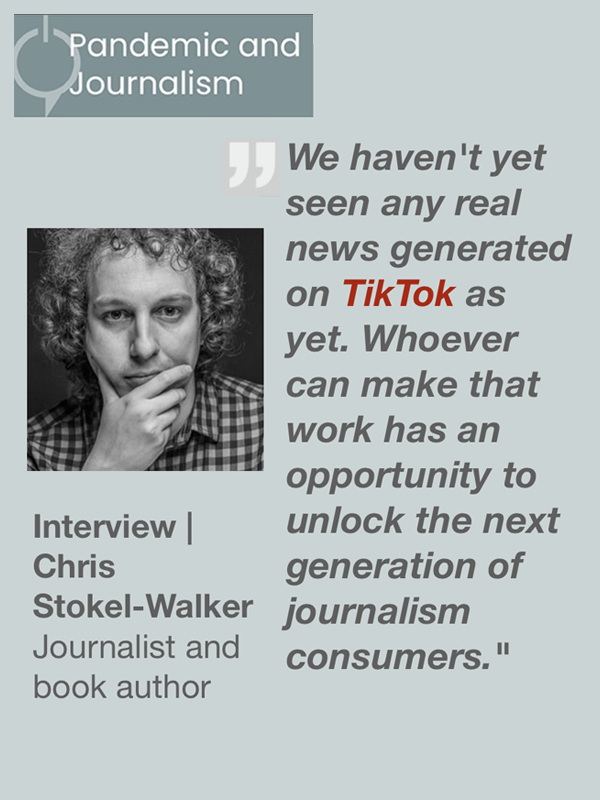Interview |Chris Stokel-Walker
Journalist, author of YouTubers – How YouTube shook up TV and created a new generation of stars
By Luciana Gurgel | MediaTalks London
Chris Stokel-Walker is a British journalist whose articles on technology, journalism, social media and culture often appear in prestigious specialised media such as The Wired and in major newspapers and magazines like The Times, Daily Telegraph, New York Times, The Guardian and The Economist. He’s extremely active on social media, somewhat provocative.
His book
In an interview to MediaTalks, he share his views on the role of social networks during the crisis and what’s next for the media industry.
Recent researches showed declining trust and use of social media for news, while legacy media grew. What went wrong for them? Do the benefits of social media for society compensate the “side-effects”, like misinformation?
Social media has given us a lot of benefits, but algorithms and filter bubbles have also entrenched view points, which is causing us problems – not least in the example of the US, where mask wearing has oddly become political. I’d hope that the pandemic is pushing people back to reputable news sources, but media literacy in general is often so low that people don’t necessarily see the benefits even while journalism does.
Growth of social media access has been seen in many countries, but haven’t follow the same pattern. Who’s the big winner of the pandemic?
One of the major winners of the pandemic, provided it’s not banned, is definitely TikTok. The number of people who have joined the app has increased enormously, and boredom has driven even grown adults to use the app in big numbers.
Global digital platforms say that are doing what they can to contain fake news. Do you agree? And will it fuel the pressure for regulation?
Platforms can always be doing more to tackle fake news – and we’re seeing just that in the way they’re doubling their efforts to tackle coronavirus fake news. What we need to do – and I’m not convinced regulation is the answer, but perhaps more force from governments is – is ensure that we have clear rules around where platforms should intervene, and where they shouldn’t. It’s easy, with a medical issue, to identify what is real and what isn’t. But when it comes to politics, it’s down to perception much more.
Recently many initiatives of independent channels offering quality journalism emerged across the world, like Tortoise. How are they doing after the pandemic?
Tortoise has managed to do incredibly well through a readership funded model, but then at the same time we’re also seeing the Guardian struggle, which has really made many question the way that journalism survives and finds a sustainable business model. While independent journalism is good, we need some recognisable names to provide brand recognition along the way.
You wrote a book on YouTube and now is writing another one about TikTok. How do you see media organisations use of this network?
The Washington Post and NPR’s Planet Money are making amazing use of TikTok on an organisational level, while independent journalists working within big organisations like the BBC’s Sophia Smith-Galer and CNN’s Max Fisher are also big on the platform. But we haven’t yet seen any real news generated on the platform as yet. Whoever can make that work has an opportunity to unlock the next generation of journalism consumers.
What’s next for the news industry as a business and for journalism as a practice after the pandemic?
We’ve seen that people are willing, in some instances, to open their wallets and pay for reputable journalism. The issue is that it’s generally the big names that are already in the best positions, such as the New York Times, that are sweeping up most of the goodwill. That’s bad news for local news organisations, which are seeing swingeing cuts. But I think we’re seeing the power of journalism to hold people and power to account across the world during the coronavirus, and I hope – though I’m definitely not certain – that we have some sort of future for a few years
Luciana Gurgel, is a Brazilian journalist based in London. She begun her editorial career at O Globo, one of the leading Brazilian media organisations. Later she founded (along with Aldo de Luca) Publicom, a successful corporate communications agency, acquired in 2016 by Weber Shandwick (IPG Group). In London, she has been working as news correspondent for Brazilian media – MyNews Channel, J&Cia – to which she writes a weekly column on trends and issue related to the news industry. The column originated a separate platform, MediaTalks, headed by Luciana from London as Editor-in-Chief, in association with Jornalistas Editora.
luciana@jornalistasecia.com.br | @lcnqgur

